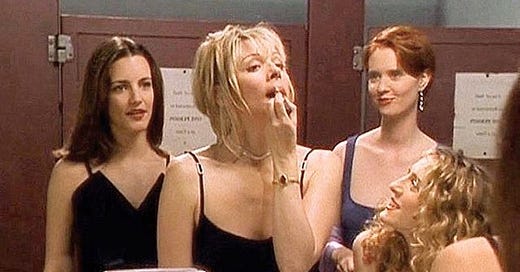the girls will save us!
“Women don’t need to be in long-term relationships. They don’t need to be married. They’d rather go to brunch with friends than have a horrible date.”
“Women don’t need to be in long-term relationships. They don’t need to be married. They’d rather go to brunch with friends than have a horrible date.”
- Greg Matos, couple and family psychologist.
The emotional, social and even financial benefits of female friendship in the modern era cannot be understated. A study published in the Harvard Business Review suggested that women who have a strong circle of friends are more likely to get executive positions with higher pay. In stressful situations, “fight or flight” isn’t the only stress response — for women, there is also “tend or befriend.” A term coined in 2000 by psychology professor Shelley Taylor, this psychosocial phenomenon suggests that women in particular often cope with stress by tending to young ones and their peers, as well as seeking connection or befriending one another. Today that comes in many forms — from yapping over margaritas at happy hour, to unabashed oversharing in the group chat.
While marriage has long been touted in society as a financially responsible decision, there are new options that allow women to circumvent the need for a partner to achieve this. Stephanie Douglass and Kristina Modares are co-founders of a real estate agency called Open House Austin that specializes in helping millennials and Gen Z purchase homes with friends. The duo now own four properties together, and have helped many more friends to do the same.
Much of the media landscape from the last few years has reflected back to us the importance of female companionship. While the main goal of Love Island has always been to find romantic love, the most compelling relationships formed during the show’s past nine years have arguably been the sisterhoods between female contestants. With a relationship success rate of 7.4% on Love Island U.K., it appears that the greatest, most enduring loves on the show might actually be the friendships.
Shows like Sex & the City and Girls have experienced a resurgence on TikTok amongst Gen Z audiences. Besides nostalgia and a morbid curiosity about whether or not they’ve “aged well” (spoiler: they have not), the intense focus on the virtues of female friendship might also have something to do with it. “Maybe we could be each other’s soulmates,” Charlotte timidly suggests in Season 4. Sure, Carrie’s rampant narcissism and flawed self-perception can be incredibly grating, but the female friendships on the show are what make it so compelling.
The same is true of Girls, which offers a sardonic window into the complex nature of both platonic and romantic love in your twenties. “In reality Girls was alluring because it was a mirror of my and my peers’ messy inner lives,” writes Sam Reed for Glamour. “We were Hannahs, Marnies, Jessas, and Shoshannas, and we dated the Adams, the Desis, the Charlies. We filled the existential voids with friendships and sex and flailing attempts at realizing our dreams.”
Culturally, the 2020s have all been about girlhood – we had hot girl summer, hot girl walks, gorgeous gorgeous girls, 30-year old teenage girls, girl dinner, and girlrotting. We tossed out the rigid constraints of womanhood and instead leaned into girlhood and the infinite love and support it generates. What’s more fun than being a giggly teenage girl with your friends (answer: literally nothing). Then, what was next but literally “girl squared”?
The concept of a “girl’s girl” rose to prominence on TikTok as an antidote to the “pick me girl”, emphasizing the importance of tight-knit female friendships over constantly seeking male validation. While the girl’s girl narrative has been uplifting in many ways, in others it has brought a severe hyperfixation on feminine friendships. Female empowerment is often tainted by internalized misogyny and patriarchal influence, which have historically succeeded by pitting women against each other. The girl’s girl mentality has encouraged many women to judge and ridicule those who do not fit into their idea of what makes a “good” woman, and more importantly a “good” friend.
“Through this policing of women’s behaviour, all these women do is further entrap women into strict and violent gender binaries that state that women are, and must always be, morally good, polite, accommodating and agreeable,” writes Halima Jibril for Dazed. “If they deviate from that norm, they will be punished. Not exactly conducive to sisterhood.”
It may be time to toss out the girl’s girl, and just acknowledge the complexity, messiness and chaos that is female friendships. They are weird and gross and insecure and beautiful. We fight, we cry and we make up. We may act like the characters on Girls sometimes (although hopefully we are a little more self aware). The point is, and always has been, the mess. A safe space where we can be our most vulnerable, insane selves.
Instead of over-analyzing and judging the habits of other women—a tradition as old as time, now accelerated online—we should be focused on all the benefits that female friendship can provide. While these intimate platonic relationships may never be able to truly replace romantic partnerships, their evolution amidst the current cultural landscape has proven their ability to quite literally provide for us (financially and otherwise) in ways not previously available or acknowledged in the past. The power of girlhood has never been stronger — it can heal us, it can help us, and maybe even it can save us.
who wrote this?
Molly is a NYC based cultural strategist who helps big brands make sense of what's going on in culture today, and how it may evolve in the future. She is a writer at heart, and in her free time publishes just vibes which covers all things youth culture and social media trends.












Tired of being seen as a sex object and a baby making machine. We are intelligent and deserve respect, I know one thing if more woman ran countries there would be fewer wars. We do not let our ego get in the way.
Platonic relationship dynamics in and between both sexes have been ivariably contorted and irreversibly influenced since the rise of mass media, which has served to implant expectations and biases as to how one should behave for other people. One could go so far as to say that social media represents the Platonic 'world of forms' as to how friendships should look, which all ought to strive towards.
The media's standards (which are a product of the incessant capitalist drive for popularity and therefore profits) are corroborated on a smaller social level.
As one can clearly observe, friendships and friend groups all resemble eachother, and can be sorted intk different types. Obviously, this is due to cultural and societal influence, propogated, at its source, by (social) media.
One can see, most especially, the typical male friendship archetype; the banter, slagging, avoidance of all vunrability, displays of masculinity etc... Most would know of this type of friendship dynamic. The same goes for females too: the arbitrary social rules and expectations mutualky and often subconciously enforced.
Friendships shouldnt have to conform to any binary propohated by popular culture or societal biases. They need not be tainted by what TikTok tells you a relationship should look like.
I miss what friendship was in the Victorian Era, when two male (or a male and female) friends could cross arms while walking, write intimate letters to one another, or even compose poetry for eachother; not vecause it was the done thing, but because they wanted to.
Male friend groups, female friend groups or a mix of both sexes should interact however they choose.
Rant over.
Read Virgil's 'Dē Amacītiā' by the way.